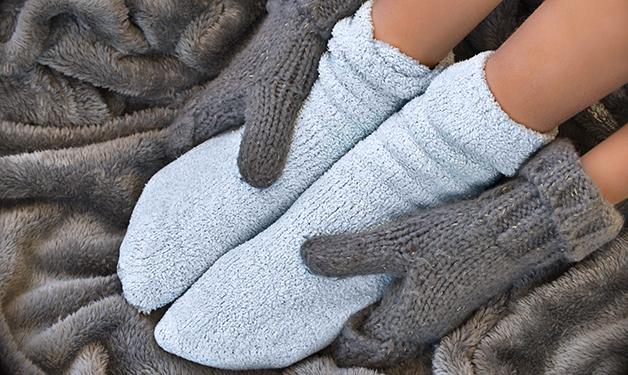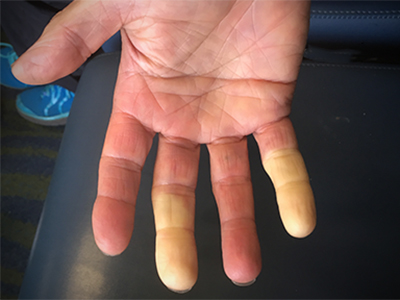
Blood and circulation expert Dr. David Taylor explains how cold temperatures put a squeeze on our blood and a tingle in our toes.
One of the first signs of winter is the reappearance of mittens, toques, puffy jackets and insulated boots. While many people look forward to hitting the slopes or strapping on the snowshoes, others may shiver at the thought of cold extremities. Vancouver Coastal Health Research Institute (VCHRI) researcher Dr. David Taylor explains why our hands and feet often seem to bear the brunt of it when temperatures drop, and what you can do to stay warm all season long.
Q: Why are my hands and feet always the first to get cold?
A: Our hands and feet are large surface areas, but they are also the farthest away from the heart. As such, our blood has to travel farther to reach them and heat them up.
Q: I am worried that I might have poor blood circulation. Is that what is causing my cold hands and feet?
A: When temperatures drop our body causes our small blood vessels to contract and restrict blood flow to our extremities—also called vasoconstriction—to maintain our core temperature. This natural response is designed to preserve our vital organs and is not necessarily linked to poor blood circulation.
Q: After being outside for a long time, sometimes my fingers get white and tingly, and it takes a while before the colour returns. What is going on?
A: White, tingling fingers after exposure to cold—called Raynaud’s phenomenon—is a more pronounced vasoconstriction. In most cases it is quite harmless, although it could be a sign of an underlying disease. My suggestion for people who describe minor symptoms of Raynaud’s is to dress warmly for the temperature. Caffeine, alcohol, blood pressure drugs and smoking can all exacerbate the symptoms of Raynaud’s, so it would be good to take that into consideration when preparing to be out in the cold.

Q: How easy is it to get frostbite on your fingers and toes?
A: Frostbite occurs after exposure to extremely cold temperatures and wind chill. It is not particularly painful, but frostbitten skin will appear white and waxy, be hard to the touch and will not rewarm and turn back to a normal colour when brought into a warm environment. Because frostbite is a thermal injury—like burns—frostbitten skin needs to be treated by medical professionals. As such, anybody who gets frostbite should seek medical attention immediately. It is also good to bear in mind that an area of skin that has been treated for frostbite can become more prone to frostbite.
Q: How can I keep my extremities warm in the winter?
A: A lot of the vasoconstriction that occurs in the hands and feet is a reaction to core temperature. So, the old saying: ‘if your feet are cold, put on a hat,’ rings true here. Putting on a hat will help your body retain heat and keep your core toasty and warm, making it easier for your heart to pump warm blood out to your extremities.



